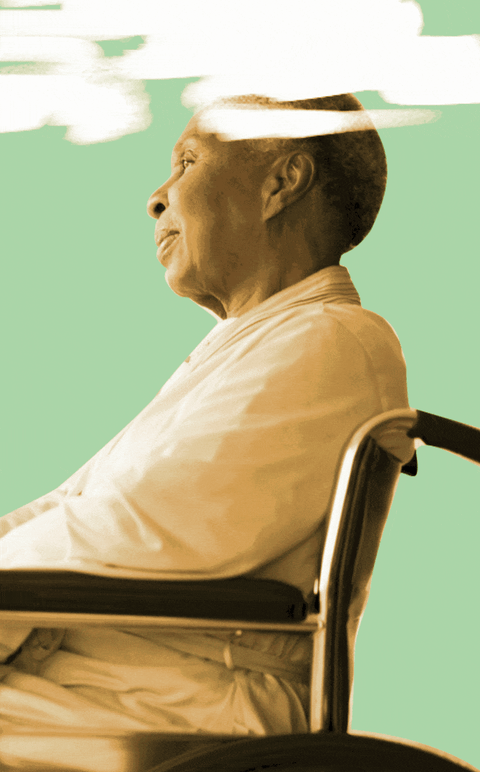Can Deficient Knowledge Be Related to Dementia Nursing Diagnosis
There are 850,000 people with dementia in the UK, with numbers set to rise to over 1 million by 2025, according to the Alzheimer's Society. This means many of us will experience a loved one developing the illness and needing care in hospital.
While it can be incredibly upsetting seeing a family member go through this, and hard to know how best to help them, there are resources available.
Here, Jo James, Lead Nurse for Dementia at Imperial College Healthcare NHS Trust, shares what she wants families of people on dementia wards to know.
What to expect when someone with dementia goes into hospital
"Some things commonly happen to people with any cognitive impairment when they come into hospital and one of those is that they're very likely to get more confused. That can be because they get something called delirium which is acute, short-term confusion. People with dementia are very likely to get that when they're physically ill," explained Jo.


.
"Home is very familiar, and they have familiar people helping them - it's usually a very secure environment for a person, mentally. When they come into hospital they can find it very disorientating and it's hard to hold on to the things that would help them normally. For example, if you're a bit wobbly on your feet you might use familiar pieces of furniture to get to the toilet but in hospital you don't have that.
"Families can come in and it seems like their loved one with dementia is ten times worse, it's really horrible," Jo added.
The dementia nurse also cites lack of sleep in hospital due to medication and observation during the night and separation anxiety because of family members having to leave as common difficulties for people with dementia in hospital.
What you can do to support your loved one with dementia in hospital
According to Jo, it's very important families understand how much time they can spend with their loved ones. Many NHS hospital trusts like Imperial College Healthcare have signed up to John's Campaign, which allows carers of people with dementia to spend as much time with them as needed, regardless of visitor's hours.
"A lot of hospitals have signed up but don't do much to advertise it, so you might not know, but if a relative says 'I want to come it at these times', a trust should allow it if they're signed up. There's the 'carers passport' so you can have a lanyard which says you're a carer and they give you access," Jo said.
Jo believes hospitals allowing and encouraging this is "helping families to realise just how important they are and that what they do is amazing. We wouldn't be able to look after virtually anyone with dementia in the country if it wasn't for the unpaid workforce we have in carers."
How to create a connection with home for a patient with dementia in hospital
After establishing this, Jo believes the best way to help someone with dementia when they're distressed and more confused than usual is for hospital staff to know information about that person.
She recommends printing off Alzheimer's Society's This Is Me document, which can be filled out to include information about a person such as what they like to eat and what they did for a living. Alternatively, you can create your own A4 document and make sure ward nurses read it.


.
"If families do that and insist nurses see it (you can stick it above someone's bed and make a point that everyone knows) then the staff will start talking about those things," Jo said.
"It's about families helping the staff to know who that person is, whether it's that he was a great boxer or he makes the best spaghetti in the world, that'll give them something to communicate about."
Jo also recommends families making a hospital bag filled with their loved one's favourite items, providing they're not too valuable. Things like photocopies of photographs, a comforting cardigan or even dolls can help to connect someone with dementia with home.
Who should families speak to about their dementia concerns and questions?
"Many trusts will have dementia teams or a dementia lead and families can look at the hospital's website for information about that. If you're struggling or you've got questions or concerns, a good port of call is the dementia team or dementia lead," said Jo.
"If it's a simple ward-based thing where you just want to have a quick chat with the someone, the nurse in charge of the ward is the best port of call," she added.
Jo recommends The Alzheimer's Society for material about supporting relatives as well as Dementia Action Alliance's Dementia Friendly Hospitals Charter which outlines what a dementia-friendly hospital should look like.
"That's really good for relatives and carers because they can look at it and see what is being done nationally, and if they feel that isn't being done at their hospital, they can ask questions as to why," Jo said.
Finally, she recommends calling the Admiral Nurse's Dementia Helpline on 0800 888 6678 for support from a registered dementia specialist nurse.
This content is created and maintained by a third party, and imported onto this page to help users provide their email addresses. You may be able to find more information about this and similar content at piano.io
Can Deficient Knowledge Be Related to Dementia Nursing Diagnosis
Source: https://www.goodhousekeeping.com/uk/health/a25332329/dementia-advice-hospital-nurse/